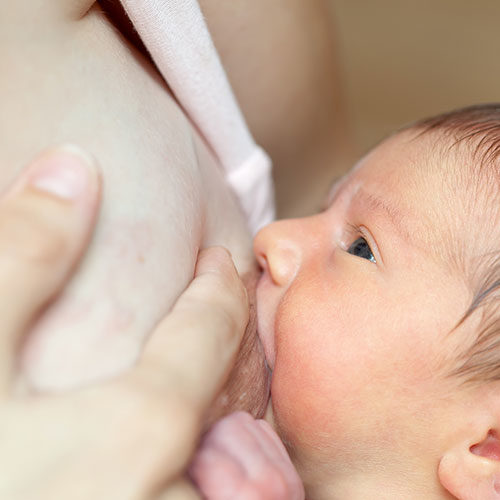Is it possible to breastfeed with Polycystic ovary syndrome (PCOS)?
What is PCOS
Polycystic Ovarian Syndrome, more commonly referred to as PCOS is a complex condition caused by an imbalance in reproductive hormones. It affects 5% to 10% of women of reproductive age.
Symptoms:
PCOS is a syndrome and not a disease. Therefore, the combination of symptoms changes from case to case. Some of the most common symptoms include the following –
- Irregular periods
- Ovarian cysts
- Underdevelopment of breast tissue
- Difficulty in getting pregnant (due to irregular ovulation)
- Raised levels of male hormones (causing acne and unwanted hair growth e.g. on face, chest, back etc.)
- Raised levels of insulin (causing excessive weight gain)
PCOS also increases the risk of developing type-2 diabetes.
Impact on Breastfeeding?
It is important to note that many mothers with PCOS have had no problem with breastfeeding and have successfully breastfed their babies. However, some women with PCOS have reported issues. There is very little research done on PCOS with regards to its impact on breastfeeding. But the two most famous studies suggest the following.
- A connection can be proposed between PCOS and insufficient milk supply. (Click here to read more)
- PCOS may interfere with hormones required for developing the milk-producing tissue in the breast. (Nesmith H, 2006)
- Maternal androgen levels in mid-pregnancy are negatively associated with breastfeeding. (Click here to read more). Higher androgen in women with PCOS can interfere with prolactin reaching its receptors – leading to low supply.
- Women with PCOS might have ‘estrogen dominance’. Higher estrogen levels even after birth can inhibit lactation causing low supply.
- About 20% of breastfeeding women with PCOS have hyperprolactinemia (elevated prolactin levels) which leads to oversupply.
Importance of Breastfeeding?
When a woman is suffering from PCOS, she is put at an increased risk of developing ‘Type-2 Diabetes’, later in life. Also, her babies are at an increased genetic risk of developing ‘Type-2 Diabetes’, later in life. Since breastfeeding provides protection to both – the mother and the baby – against developing ‘Type-2 Diabetes’, later in life; it is very important for a mother suffering from PCOS to breastfeed.
How to facilitate Breastfeeding?
- During pregnancy, a woman with PCOS might want to observe the changes in her breast. If the changes like early tenderness, darkening of the areola, growth of the bumps around the areola, breast growth towards the end of pregnancy etc. are not observed, she should consult a lactation professional.
- Ensure skin to skin without delay after birth.
- Ensure good positioning and latching.
- Nurse frequently and on-demand.
- Avoid artificial teats and dummies.
- Ensure the baby is getting enough.
- Avoid supplementation unless medically indicated.
- Consume galactagogues, if required.
- Use SNS, if supplementation is required.
- Sometimes, low supply might need to be taken care of by medication. If supply remains low even after doing everything right, consult your medical care provider for prescribing medication to increase supply.
- If you have oversupply, learn to deal with it.
References :
https://www.llli.org/breastfeeding-with-polycystic-ovary-syndrome-pcos/
https://www.breastfeeding.asn.au/bfinfo/polycystic-ovarian-syndrome-and-breastfeeding
http://www.mobimotherhood.org/polycystic-ovary-syndrome-pcos-and-breastfeeding.html

Wish to speak with a member of our team who is a certified lactation professional and also an experienced breastfeeding mother, click on this link.
Medical Advice Disclaimer
THIS WEBSITE DOES NOT PROVIDE MEDICAL ADVICE.
The information, including but not limited to, text, graphics, images and other material contained on this website are for informational purposes only. No material on this site is intended to be a substitute for professional medical advice, diagnosis or treatment. Always seek the advice of your physician or other qualified health care provider with any questions you may have regarding a medical condition or treatment before undertaking a new health care regimen, and never disregard professional medical advice or delay in seeking it because of something you have read on this website.
Disclaimer
We understand and acknowledge that parents and babies can be of various genders on a spectrum of LGBTQI+. Families come in diverse flavours. However, in our articles, for the sake of simplicity and convenience, we will be referring to the breastfeeding parent as the mother and using the female pronouns- ‘she’ and ‘her’ for babies. Babies can be nourished and nurtured in different ways and while we have used the terms breastfeeding and nursing, we recognize that parents can opt to chest feed or finger feed.
We don’t have conflicts of interest and declare, and we are compliant with the WHO code of marketing of breastmilk substitutes and the IMS act.
In case you find any information on this website that needs to be updated, please write to us at info@bsim.org.in






